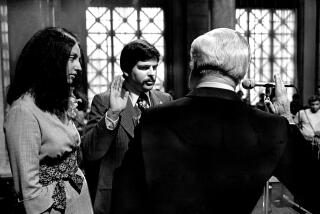Incomplete Control
It was a gray, sleeting winter morning, and Judith Viorst was packed and poised to begin her New York-Washington-Chicago-St. Louis-Portland-Los Angeles tour to promote her book on controlling your life. At the airport, she found out all the flights had been canceled. Undeterred, she made her way to the train station and bought a seat to D.C.
Somewhere between Washington and Chicago, her luggage was lost, and halfway through her first night in the Windy City, the Viorsts’ neighbor back in Washington phoned to say that their house was on fire. Damage was confined to the kitchen.
Ten days of ice storms, floods, lost hotel reservations and still-missing luggage later, Viorst is sitting cross-legged in the corner of a Beverly Hills hotel room recounting the trials of her journey.
“It’s like some big cosmic joke. I’m carrying around this book on controlling your life . . . and, as you see, my life has not been under my control. I’ve tried to make the best of it, but I can assure you it has been very, very strenuous.”
As bad as Alexander’s famous terrible, horrible, no good, very bad day?
“Oh my yes,” sighs Alexander’s mother. “It was like Alexander’s day and then some.”
But who better to deal with such stress than a woman once honored by the American Psychiatric Assn. for “contributions to the mental health of the nation”? Viorst has been crisscrossing the country talking about her latest effort to polish the American psyche--”Imperfect Control” (Simon & Schuster). It’s a sometimes-poignant, sometimes-witty self-help book that uses poetry, anecdotes, Freud, Piaget, Deepak Chopra and others to dispel the notion that there is any such thing as perfect control.
Although her all-time bestseller remains the story she wrote to soothe her troubled 4-year-old son after a particularly rotten day--”Alexander and the Terrible, Horrible, No Good, Very Bad Day” (MacMillan) has sold more than a million copies since it was published in 1972--Viorst’s newest book can be read as a grown-up version of the Alexander book.
Viorst, 67, has written fiction, nonfiction, children’s stories, adult mysteries, screenplays, poetry and songs. Married for 38 years to Middle East scholar Milton Viorst, whose own book on Islam is due out in spring 1999, Viorst has a special interest in the balance of power between husbands and wives, parents and children.
When she began work on her 24th book three years ago, it was with the idea of sharing some of the insights gleaned from six years of psychoanalytic training and four years of personal analysis at the Washington Psychoanalytic Society. Still, she says, she was unprepared for how the book would take control of her life.
“This book became an obsession,” recalls Viorst. “I was thinking about it in the shower, thinking about it in the car, I couldn’t stop thinking about it, no matter where I was. Once you start looking at the world in terms of control issues, you see, it really is impossible to stop.”
Indeed. Here is Viorst on language as a tool of control:
“ ‘Baby Beluga’!” commands my grandchild Miranda, and her mommy flips on the tape deck and plays that tune. “Grandma Judy, dance!” commands Miranda, and I leap from my chair.
On sex as control:
We cannot know “the wild chaos of love” unless we risk dissolving the boundaries of self. We cannot know the wild ecstasy of passionate sexual love unless we risk surrendering control.
On guilt as control:
Isn’t it easier to feel guilty sometimes? Easier to take the blame, easier to believe that there is something you could have done to avoid this awful thing that’s happened rather than to feel that you have no control, to know your life is out of your control?
“When people get mugged, they feel better if they can blame themselves,” says Viorst. “They need to feel guilty as a way of reassuring themselves that they’re not simply walking along the edge of an abyss . . . .”
Viorst blinks her large brown eyes and daintily adjusts her oval-framed glasses.
“We’ve all been there, from seeing something awful happening to those we love and being desperate but powerless to stop their pain to believing that you can make yourself perfect by writing down those same New Year’s resolutions year after year.
“The search for perfect control over your kids, your spouse, your work, even your death is very difficult to give up. That’s because when you have the illusion of control--that brief burst of euphoria you get from being the master of your fate, the captain of your soul--you feel on top of the world. Until the next crisis. That’s the point of the book--control what you can; just know when to stop.”
For Viorst, the Phi Beta Kappa overachieving mother of three boys, learning how to stop trying to control her children’s lives has been especially difficult. The same eager-to-please mommy Alexander blamed for forgetting to put a dessert in his school lunch and for serving him lima beans for dinner and for allowing his Mickey Mouse night light to burn out continues to wonder what, if anything, she can do to make her children’s lives “as perfect as possible.”
I never claimed to be the perfect mother.
I made mistakes. Well, everybody did.
But God, I was so glad to be his mother.
And God, oh God, oh God, I loved this kid.
I love this kid.
Patience and laughter and trips to the beach and tickles and song,
Did I do something wrong?
For Viorst, true control is nothing more nor less than self-control, and assuming responsibility--not blame--for the way we live.
“When all these things were happening on my way out here I felt like there was a huge dark cloud over my head,” says Viorst, hugging her knees. “I wanted to go home, curl up in a ball and forget the whole thing. But I didn’t. I kept going even as things seemed to get worse and worse. That’s what you call ‘imperfect control.’ ”
More to Read
Sign up for our Book Club newsletter
Get the latest news, events and more from the Los Angeles Times Book Club, and help us get L.A. reading and talking.
You may occasionally receive promotional content from the Los Angeles Times.






